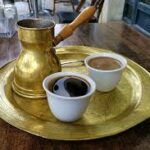We just launched Holy Grounds: The Surprising Connections Between Coffee and Faith with Tim Schenck For Individuals and For Groups.
In Ethiopia, coffee drinking is an hour-long ritual. In Turkey, they say that coffee should be “as black as hell, as strong as death and as sweet as love.” Espresso drinks are ubiquitous in Italy. The Vietnamese serve iced coffee with thick, sweet condensed milk. Debates about the difference between Mexican cafe con leche, French cafe au lait (which is often made with espresso in France), and Italian cafe latte abound, but it’s safe to say that across all these countries, people like espresso served with hot, foamed milk. In Hong Kong, coffee is served mixed with milk tea. Brazil produces the most coffee in the world, but Scandinavians drink it most.
Coffee, in short, is common everywhere and impacts people’s day-to-day lives all over the world. It can be fancy and expensive or basic and affordable, served in big mugs or tiny cups, drunk on the go or savored slowly, but in its various forms, it tops most lists (along with tea and beer) of the most-consumed beverages in the world.
Because we use it so much, both in our culture and in our churches, it’s only fitting that  as Christians, we examine this drink in our midst. What is its role in our social lives? Are we using coffee in wholesome and meaningful ways? Do we savor it as part of God’s creation? What consideration do we give to the ways that coffee is made and processed in terms of how we relate to God’s creation and to one another?
as Christians, we examine this drink in our midst. What is its role in our social lives? Are we using coffee in wholesome and meaningful ways? Do we savor it as part of God’s creation? What consideration do we give to the ways that coffee is made and processed in terms of how we relate to God’s creation and to one another?
In this class, the Rev. Tim Schenck — priest, author, Lent Madness creator, and blogger — takes us on a journey examining the origins and rituals of coffee preparation and consumption. He discusses the early Christian response to coffee and ways in which how we choose to prepare and drink coffee can affect our spiritual lives. He also discusses our responsibility as Christians to consider how our consumption of coffee affects people’s lives across the world.
This class is ideal for people seeking spirituality in their day-to-day lives, people interested in social justice and consumer culture, and, of course, people who love coffee. For a preview, please click here.


